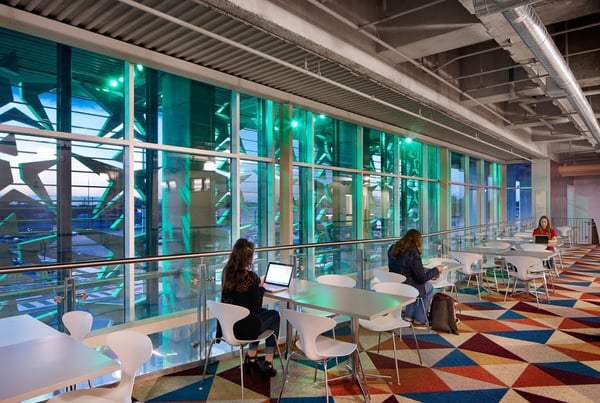Published on
Meeting Students Where They Are: Critical for Success in Developmental Hybrid Programming

Hybrid programs can represent the best of both worlds for higher education providers. Such offerings create opportunities for students to receive the personal touch that often sets colleges and universities apart while allowing for the convenience and flexibility that have made online and distance programs so successful over the past three decades. In Austin, there is a project in place that has created a hybrid option to developmental, remedial programming that helps prepare students for college-level work.
The EvoLLLution (Evo): Why did Austin Community College decide to launch the ACCelerator project?
Stacey Guney (SG): The project is a result of several different elements coming together at the same time: the availability of the Highland Mall property (where the ACCelerator is located), the pressing need for new and flexible learning environments and curriculum delivery, and the desire to experiment with teaching and learning in bold ways.
Evo: How do students benefit from the ACCelerator?
SG: The ACCelerator offers a range of programs for students. The main draw in the first year has been the redesigned developmental math curriculum, which combines all three courses of developmental math in one sequence. That curriculum is totally adaptive and allows students to proceed at a pace that is appropriate for each student. The students have shown that they appreciate this with over 90 percent of those who had not yet finished the sequence continuing on in the second semester. We even had two students finished all of the coursework in less than eight weeks! That is the kind of flexibility and customization that students need.
Most of all, students are feeling more successful. I am reminded of one of our students, Rafina, who is 52 years old and an assistant in a nursing home. She had given up on her dream of becoming a nurse. She felt that the math required was something she could never learn. Last semester, she pulled me aside with tears in her eyes and thanked us for giving her hope back.
Students are also using the space as a hub for their learning. Several groups have “cohortized” themselves into study groups. While we do not offer nursing courses at this location, it is centrally located and a group of nursing students meet every afternoon after their clinicals. We are able to introduce prospective students to them and they share the study skills that are necessary to succeed in the program. We have a group of students who are meeting every Friday and Saturday morning for Maker Meetups.
In addition to students supporting one-another, we have five part-time “academic coaches” who are available for scheduled and drop-in meetings. They work with students who feel they “just don’t get it.” They are struggling, in the first instance, not with a particular subject matter, but with what it means and what it takes to be a college student. The coaches work through a range of non-cognitive skills such as time management, organization, note-taking, test-taking and study skills.
Evo: How does running the ACCelerator benefit ACC?
SG: Students are engaging with their learning. As a result, they come to the ACCelerator and they stay and they return. Anytime we have the opportunity at a commuter college to engage with our students in these deep and meaningful ways, we know that it directly contributes to student success. Students are coming to the ACCelerator even when there are no scheduled classes on campus. They are coming before their classes and staying on after their classes. In the same way that the space functioned when it was a mall—as a gathering place—it is now serving the same role for the community in its newest reincarnation. The space also means that there is “no back of the classroom”—the typical place where at-risk students tend to try and hide. The technology also used in the curriculum doesn’t allow for students to hide. Each professor knows exactly where each student is and this helps to create a much more personal connection with students. The withdrawal rate is significantly lower and the retention rate significantly higher in the developmental math compared to the traditional courses.
Other courses taught in the ACCelerator express that the environment is much more like the professional environment that the students are already in or will be in their professional lives. Courses that are scheduled in the space on an “ad-hoc” basis enjoy the benefit of having a flexible space that they can use for more collaborative and project-based learning.
The feedback that we get from the students has been incredibly positive. Since this campus opened, our enrollment as a college has increased. This, following a trend of the last few years of slight annual decreases in enrollment. Even in the first two weeks of this summer semester, we have already seen over 2,000 unique students in over 5,000 visits! In the spring semester, we had a headcount of 4,386 and the ACCelerator served over 5,300 unique students in over 60,000 visits!
Additionally, the space allows us to offer a variety of services, both instructional and student services, in one space. Since we offer classes in the evenings, early in the mornings and on weekends, we can provide all of our students with access to a computer and learning support in a central location.
Evo: What were some of the most significant challenges you faced in getting the project off the ground?
SG: Our launch coincided with the opening of ACC’s new Highland Campus, which included the redesign of the developmental math curriculum that used the ALEKS software with a brand-new technology solution—the virtualized desktop. Any one of those things would have been a major undertaking on any single day!
The scope of this project from day one has been huge. It has been a wonderful example of how so many groups can work together to deliver a project. This type of space has never really been planned or deployed before in higher education. The breadth and size of the initiative held the innate challenges of doing something new and BIG. The vision of our president and upper-level administrators has ensured that we have the support necessary to be successful. Once our doors opened, all of our faculty and staff that have experienced the space have responded extremely positively!
Evo: What are some of the most significant challenges in managing the students and staff who work in the ACCelerator?
SG: Staff that work in the ACCelerator come from a variety of divisions and they all still report through their specific divisions. Communication is key to join all the diverse groups together into a cohesive center.
It is really hard to explain how the ACCelerator concept operates without experiencing it. Being in the space means that you are highly visible and very mobile. Resources come to the student instead of relying on the student requesting and moving from one area to the next. That is a transition for many people. One faculty member says that he makes it a point not to sit down at all during class! We literally and figuratively try to meet each student where they are!
Evo: How do you see the ACCelerator evolving in future?
SG: We already have plans to add to the programs in the ACCelerator in the fall. The computer-aided design (CAD) department will be offering courses. A competency-based Accelerated Computer Training program will be offered as part of both a new Career Expressway program and our Early College High Schools. Math is continuing to spread its footprint. We are looking at extending our hours. I would like to see us try out new ways of supporting programs. We are also discussing the ability to use “nudges” with the academic coaching and looking at opportunities to support our online students.
In essence, while the ACCelerator has gotten off to a great start, there’s more we can do to improve student outcomes and the student experience.
This interview has been edited for length.



